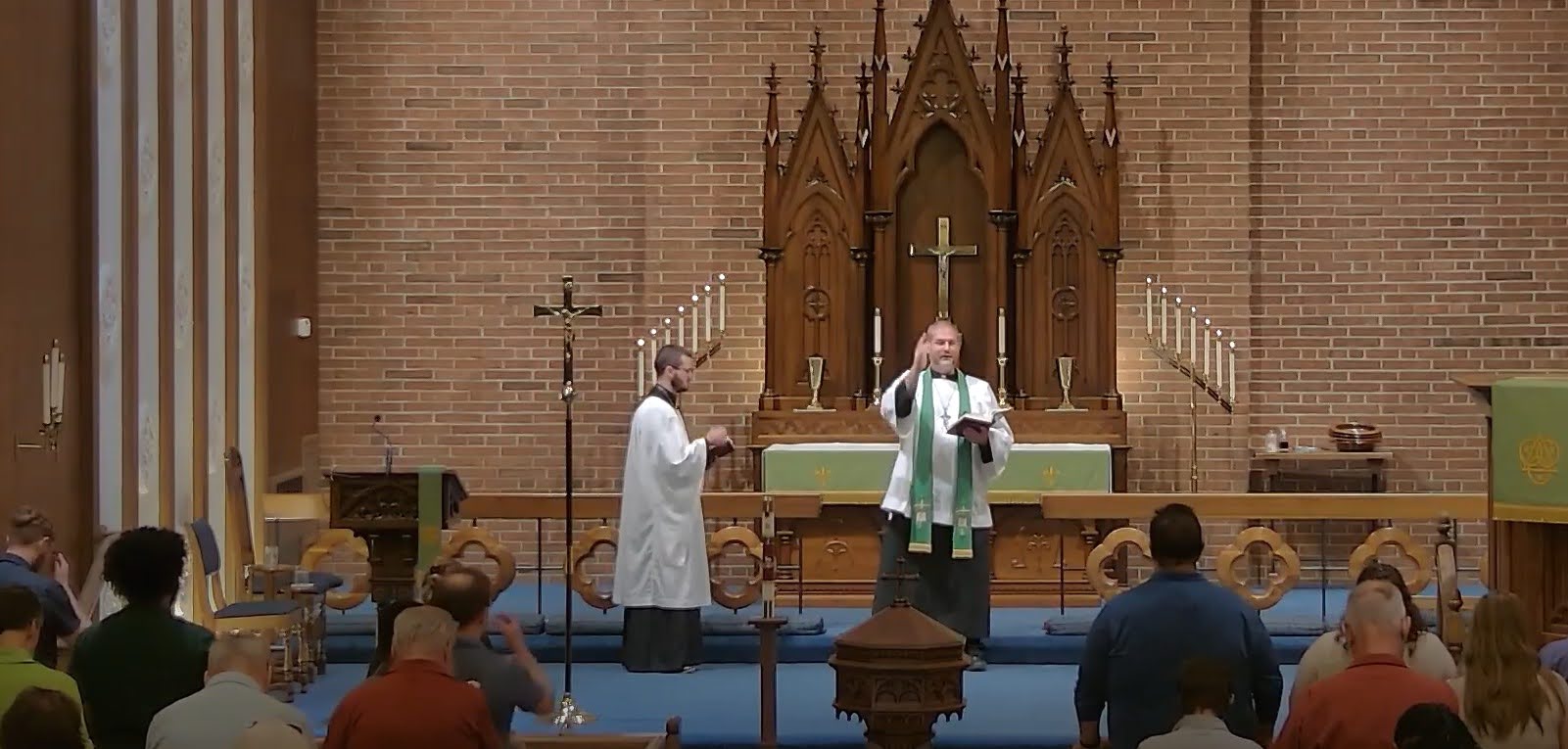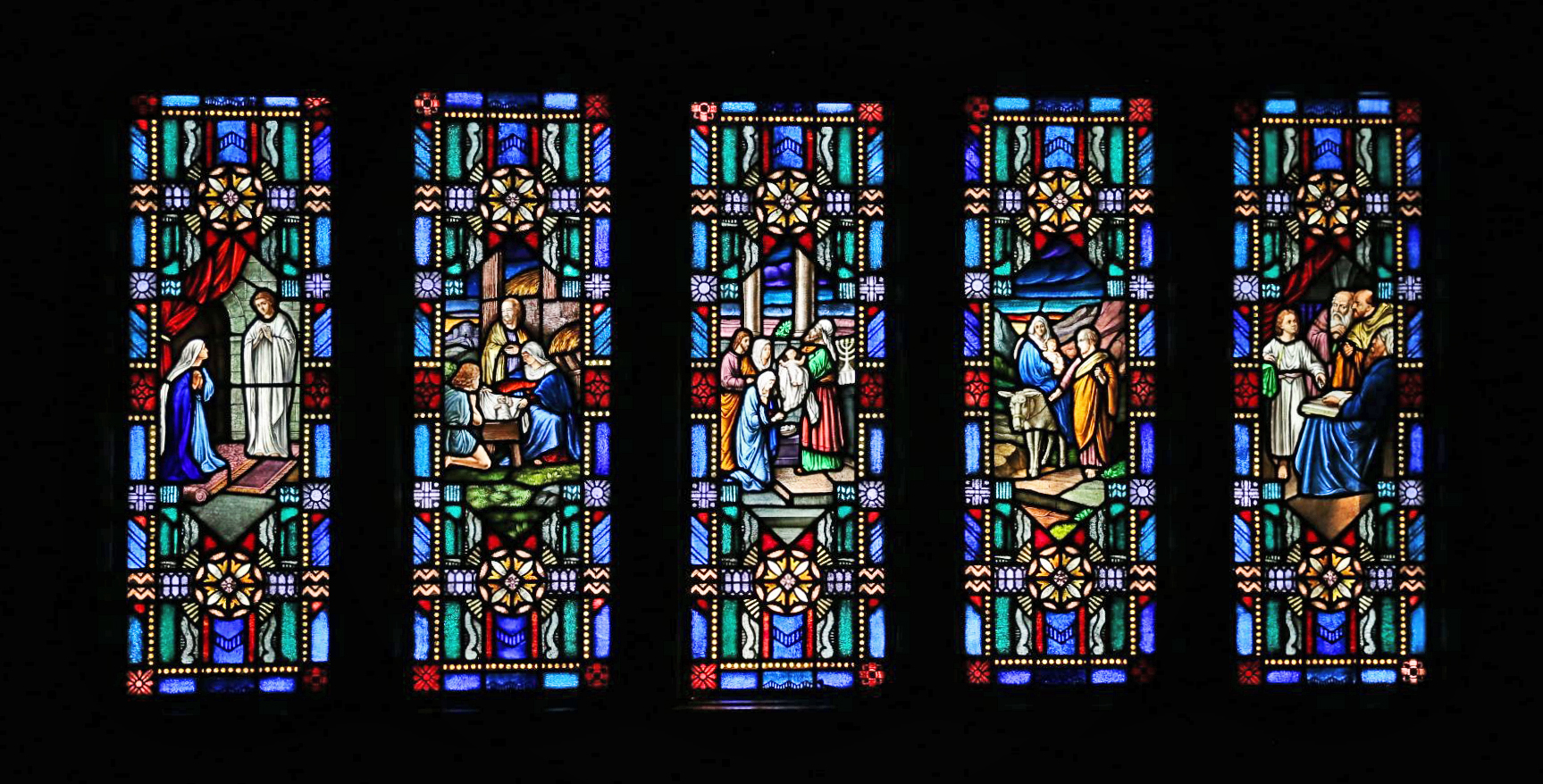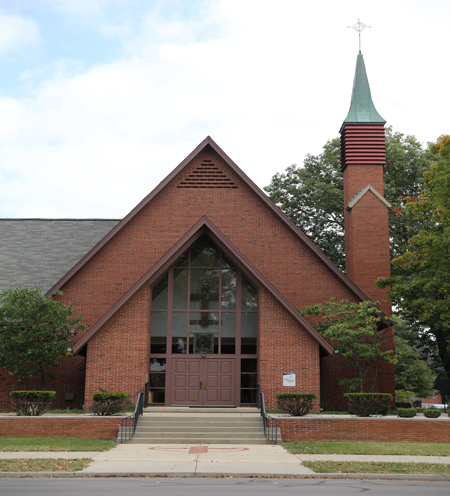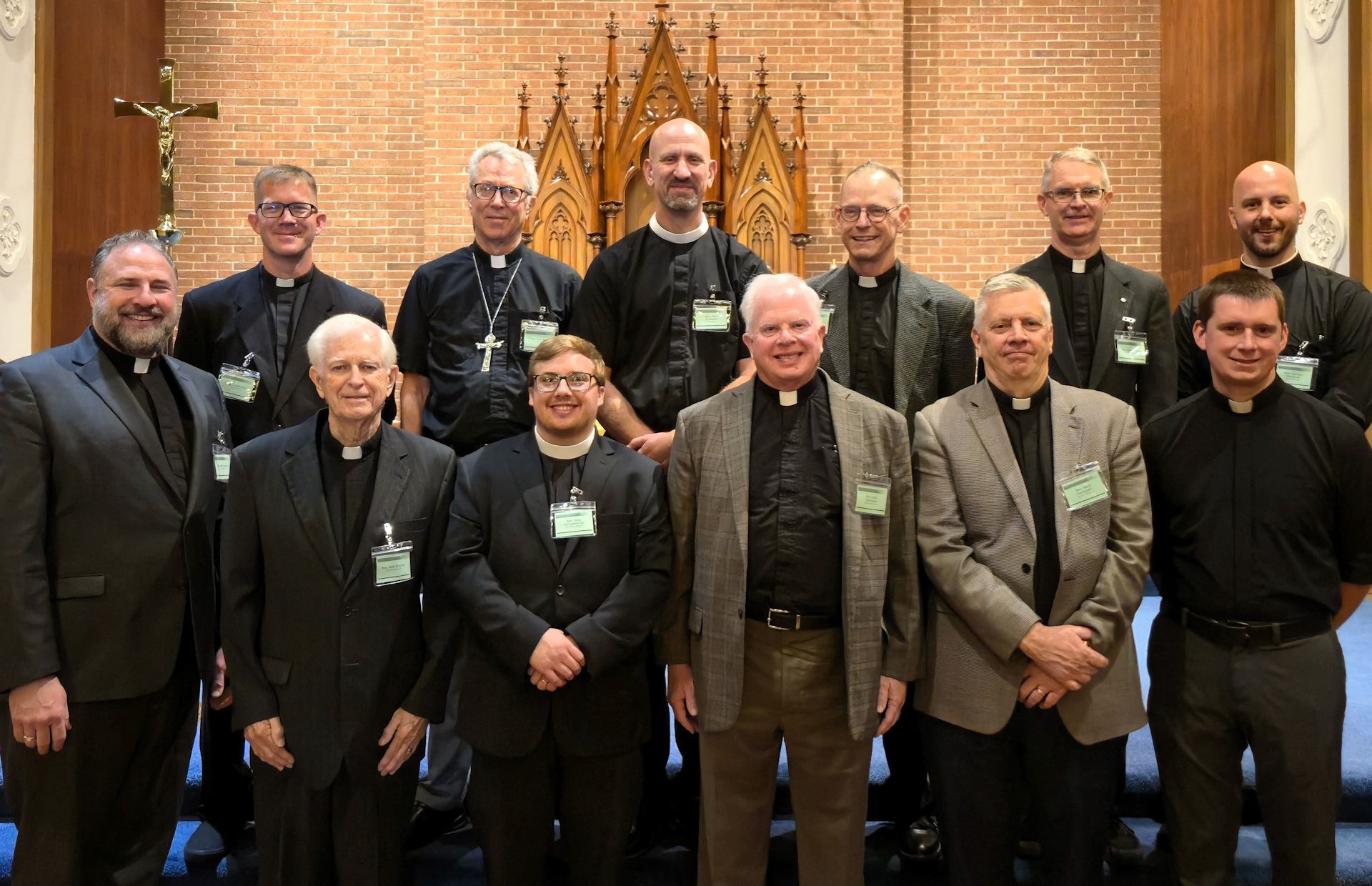Presenters And Presentations
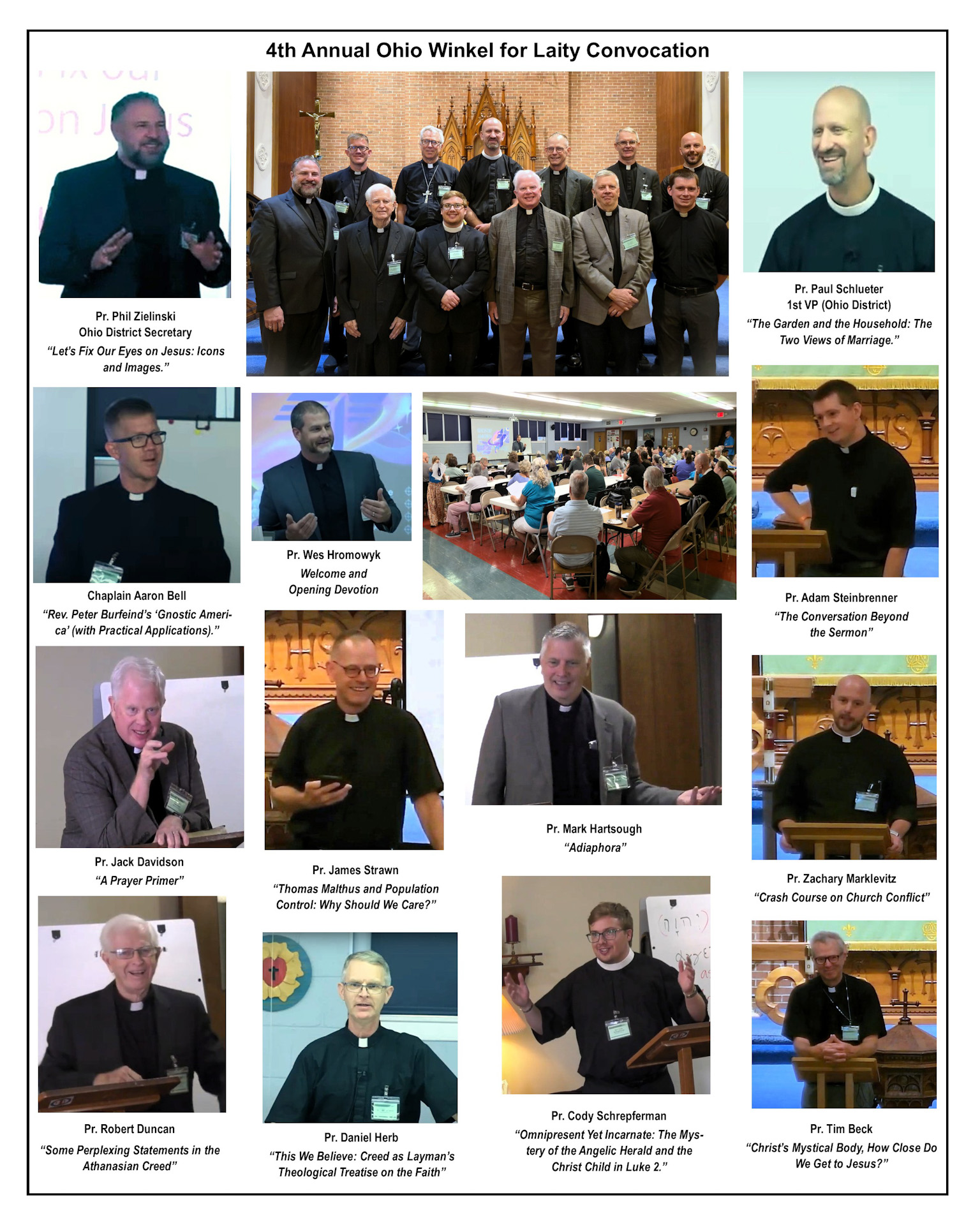
- Opening Pastor Hromowyk
- Aaron Bell, Chaplain (Zion, Columbus, OH) – “Rev. Peter Burfeind’s ‘Gnostic America’ (with practical Applications).” What is Gnosticism? Is it a new or old problem? How is American society shaped by this dangerous and devious form of heresy? How does this philosophy impact marriage and children? How is the LC-MS uniquely poised to deal with this false teaching? What are some practical steps Christian parents and couples can take to counter this philosophy’s impact in daily life? Come and see!
- Paul Schlueter, Pastor at St. Paul’s Lutheran Church (Chuckery, OH) – “The Garden and the Household: The Two Views of Marriage.” There are two basic views of marriage: there is the view that comes to us from scripture and the other that is the predominant view in the world across cultures and throughout history (including even our supposed modern and enlightened view). In Pastor Schlueter's presentation we will explore these two views and demonstrate the blessings of marriage as given to us in scripture as a place for a man and wife to establish a home where they can live and raise their children in godly love and service.
- Adam Steinbrenner, Pastor at St. John’s Lutheran Church (Dublin, OH) – “The Conversation Beyond the Sermon.” We hear sermons, a lot of them. As hearers of sermons, we forget that sermons are not only meant for hearing but also for discussing. But what do I say about a sermon? With some vocabulary and a framework, this sessions seeks to bolster conversing about sermons – ranging from conversations among fellow congregants to conversations we have with our pastors about their sermons.
- Mark Hartsough, Pastor at New Hope Lutheran Church (Granville, OH) – “Adiaphora.” The ancient Greek philosophers used the term roughly in a way that means “no difference.” They were concerned with the idea that wealth and fame are not good or bad in and of themselves. The Reformers adopted the term during the Augsburg Interim. King Charles V was trying to force the Roman Catholic Church and the Protestant Churches to reunite. The question became, what doctrine is worth fighting for and which one is Adiaphora, that is, no difference? We wrestle with some of the same issues today. The idea of Adiaphora drives to the heart of what it is to be Lutheran, “Scripture Alone.”
- Cody Schrepferman, Pastor at Gethsemane Lutheran Church(Marion, OH) – “Omnipresent Yet Incarnate: The Mystery of the Angelic Herald and the Christ Child in Luke 2.” There are a vast number of occurrences throughout the accounts of scripture of the Angel of the Lord, primarily in the Old Testament as he is called the מַלְאַ֧ךְ יְהוָ֛ה but also in the New Testament as he is called αγγελος κυριου. We will explore these occurrences to better understand which of these references point to a distinct manifestation of the blessed second person of the Trinity, and to better understand the Divine Omnipresence of our Lord Jesus Christ. No prior knowledge of Greek or Hebrew is necessary as all terms will be explained as they come up.
- Tim Beck, Pastor at St. Paul Lutheran Church (Cincinnati, OH) – “Christ’s Mystical Body, How Close Do We Get to Jesus”? Drawing from Luther’s commentaries, we explore what it means to be Christ’s body. This includes examining Scripture’s teaching about the unio mystica in relation to justification and sanctification, and touching on our Lord’s purpose for us in this life and the next.”
- Phil Zielinski, Pastor at St. Paul Lutheran Church (Valley City, OH) – “Let Us Fix Our Eyes on Jesus: Icons and Images.” Our eyes are constantly bombarded with images. Some inspire us and build up our faith; others, tempt and distract us. Christianity has enjoyed a rich legacy of art and symbolism to teach the faith. Come and learn about the place of art and imagery as gifts from God and examine the style of “iconography” in particular.
- Jack Davidson, Pastor at Redeemer Lutheran Church (Lancaster, OH) – “A Prayer Primer.” In this session we will look at the spiritual discipline of prayer. Questions we will consider are: What is prayer? What is the language of prayer? What are the types of prayers that I can use? Is there a key to praying? What is available to assist in my prayer life?"
- James Strawn, Pastor at St. James (Archbold, OH) – “Thomas Malthus and Population Control: Why Should We Care?” Few comprehend the degree to which the concept of over-population has influenced our world. Is it true? When did this belief begin? What influence has it played on incidental and purposeful genocide? Most importantly for today, how has it determined our understanding of sexuality and the godly purposes of Christian marriage and family? This presentation will be something of a survey and include suggestions for further study in this critical topic.
- Bob Duncan, emeritus (Emanuel, Lancaster, OH) – “Some Perplexing Statements in the Athanasian Creed.” At first glance, some confusion can arise between statements of the Creed and that of clear biblical teachings. In particular, paragraphs 38 and 39 of the Creed speak of good and evil works and the part they play when a person is standing before the Judgment Throne of God. A close examination of 'works', when contrasted to clear, unambiguous, teaching of God's Holy Word, will reveal that there can be some ambiguity of the paragraphs' statements, but there is, however, no contradiction between them and clear Scriptural truths.
- Zachary Marklevitz, Pastor at Grace Lutheran Church (Wyoming, MI) – “Crash Course on Church Conflict” Congregations are not immune to conflict, as sinners gather in the Lord’s name to receive forgiveness. Yet tensions outside the sanctuary can still wound Christ’s people. How are we, as the Church, called to respond in ways shaped by Scripture and grace?
- Daniel Herb, Pastor at Messiah Lutheran Church (Middletown, OH) – “This We Believe: Creed as Layman’s Theological Treatise on the Faith.” One of the great challenges of our day for the advancement of the Gospel is the confidence of Lutherans to converse with non-Lutherans and non-believers about what it means to be a Lutheran; just what is it that we believe. Peter writes (1 Peter 3:15), “But in your hearts revere Christ as Lord. Always be prepared to give an answer to everyone who asks you to give the reason for the hope that you have.” Many laity struggle with articulating the content of the faith. This presents a challenge for pastors in equipping the saints with tools that the Holy Spirit can work through. While there is no shortage of new programs and training promising results, let us consider a return to the Creed that has been passed down to us through the centuries and explore how it can help us confess the faith in the 21st century.
- Closing Service
